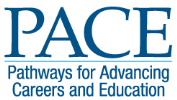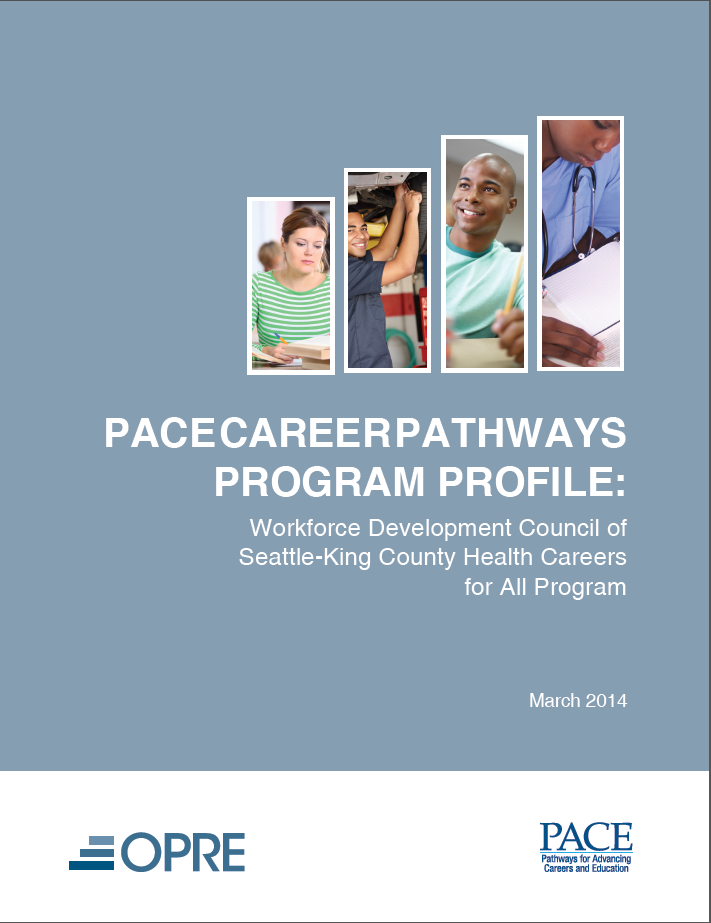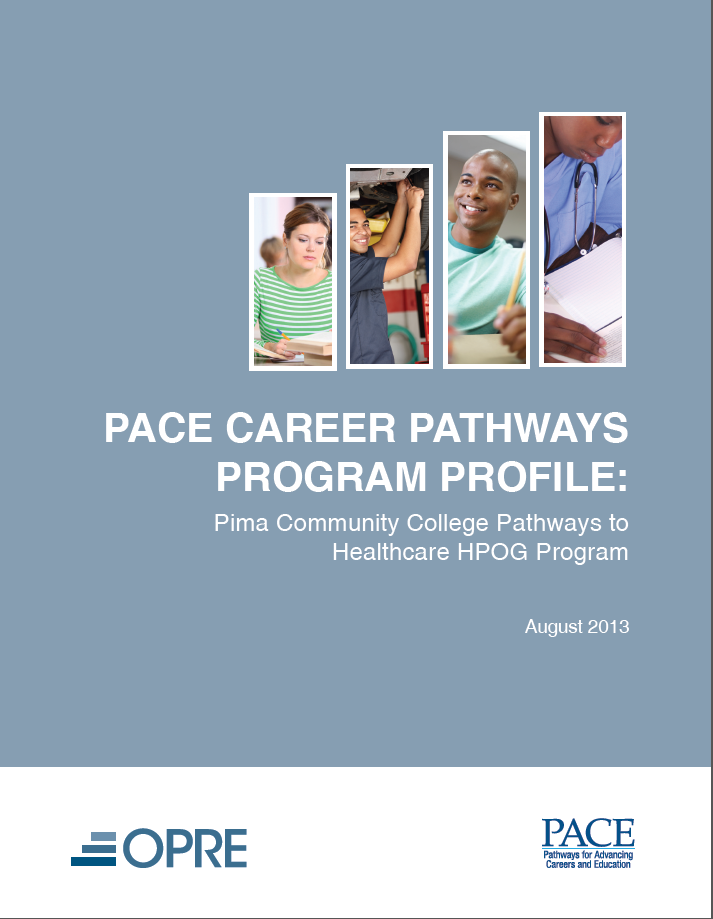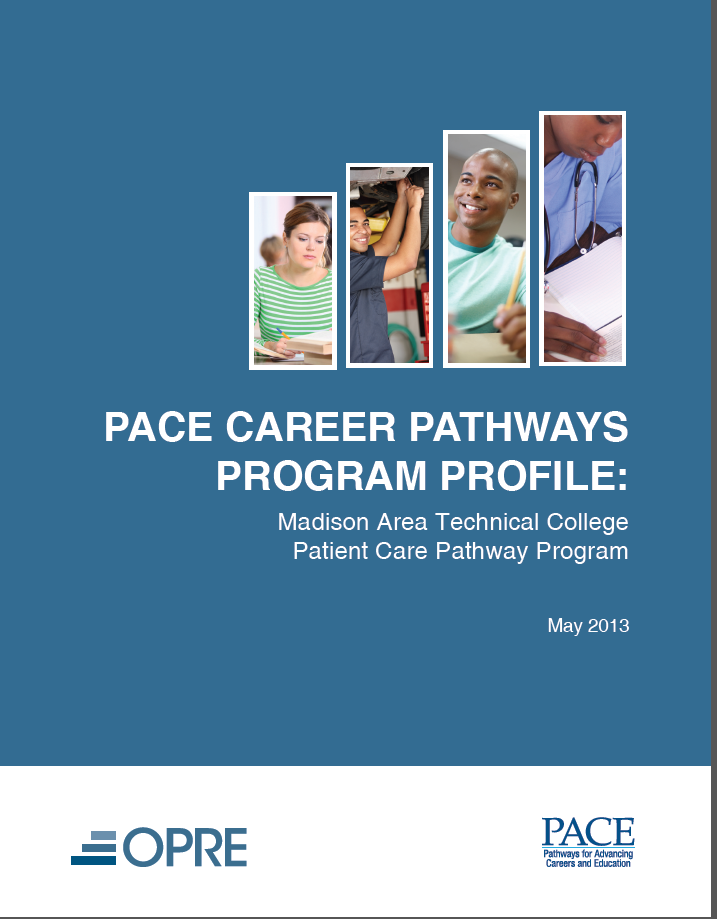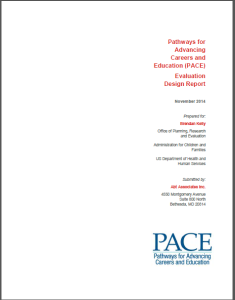 Pace Evaluation Design Final Report (PDF) ( 107pp, 1MB) (November 2014)
Pace Evaluation Design Final Report (PDF) ( 107pp, 1MB) (November 2014)
This evaluation design report describes the career pathways framework, the major study components, and study data sources of the Pathways for Advancing Careers and Education (PACE) project. In recent years, career pathways have emerged as an innovative framework for improving education, training and skills, and improving economic self-sufficiency. PACE is the first-ever randomized controlled trial of career pathways programs, featuring 9 of the country’s leading and innovative programs.
The evaluation design report includes: an overview of PACE and the career pathways framework; a description of the program selection process, the sites, and research questions; a study timeline; a list of deliverables; a description of the implementation study; a description of the impact study; a description of the cost-benefit study; and information about data sources.
 PACE Evaluation Update Webinar (PDF) (56pp, 2.1MB) (March 2015)
PACE Evaluation Update Webinar (PDF) (56pp, 2.1MB) (March 2015)
In this interactive and engaging webinar, we provide an update on the status of the PACE evaluation, talk about the next phase of the study, and hear from partners on such topics as sustainability/scaling, engagement, progression, and other issues of relevance to programs. View the webinar.
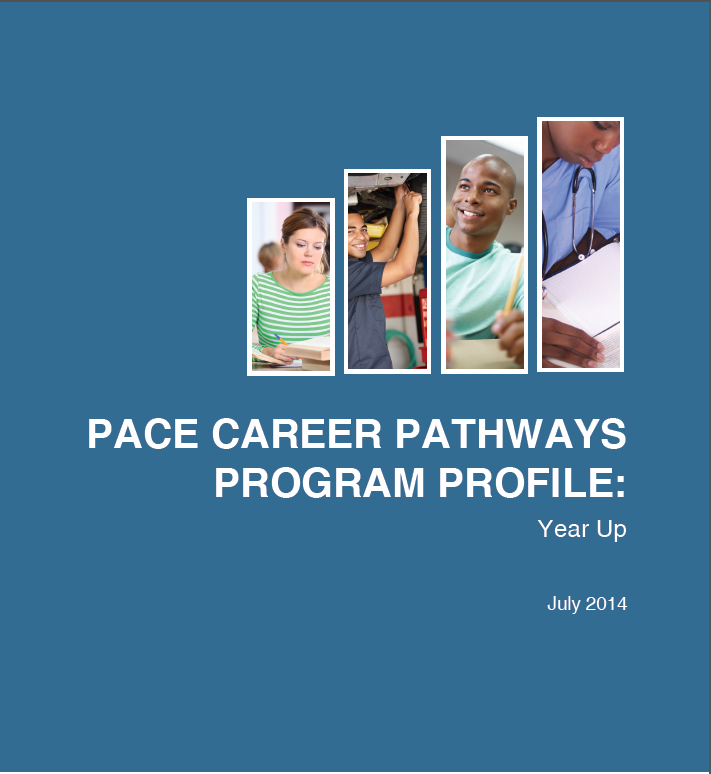
Career Pathways: Year Up (PDF) (24 pp, 7.9 MB) (August 2014)
This profile is an overview of Year Up, a 501(c)3 organization whose mission is to “close the Opportunity Divide by providing urban young adults with the skills, experience, and support that will empower them to reach their potential through professional careers and higher education.” The one-year program offers 18- to 24-year-olds a comprehensive service package that includes 21 weeks of occupational training, classes in professional skills and business communications, guidance and supports, and connections to employment that include a six-month internship.
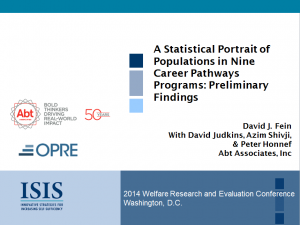 Learning What Works in Career Pathways Programming: The PACE Evaluation (Power Point) (22 pp, 293 KB) (May 2014)
Learning What Works in Career Pathways Programming: The PACE Evaluation (Power Point) (22 pp, 293 KB) (May 2014)
Research on the effectiveness of government-funded programs increasingly calls for more than a “yes or no” verdict, and instead calls for examining the so-called “black box.” This presentation describes how PACE, formerly known as ISIS, is investigating which aspects of programs are responsible for impacts (or lack thereof) and discuss implications for future research and program design.

A Statistical Portrait of Populations in Nine Career Pathways Programs: Preliminary Findings (Power Point) (19 pp, 1.7 MB) (May 2014)
Career pathways programs provide post-secondary education and training organized as a series of manageable steps leading to successively higher credentials and employment opportunities in growing occupations. This presentation discusses what we know so far about the characteristics and outcomes of participants in the career pathways programs being evaluated by OPRE’s Pathways for Advancing Careers and Education (PACE).
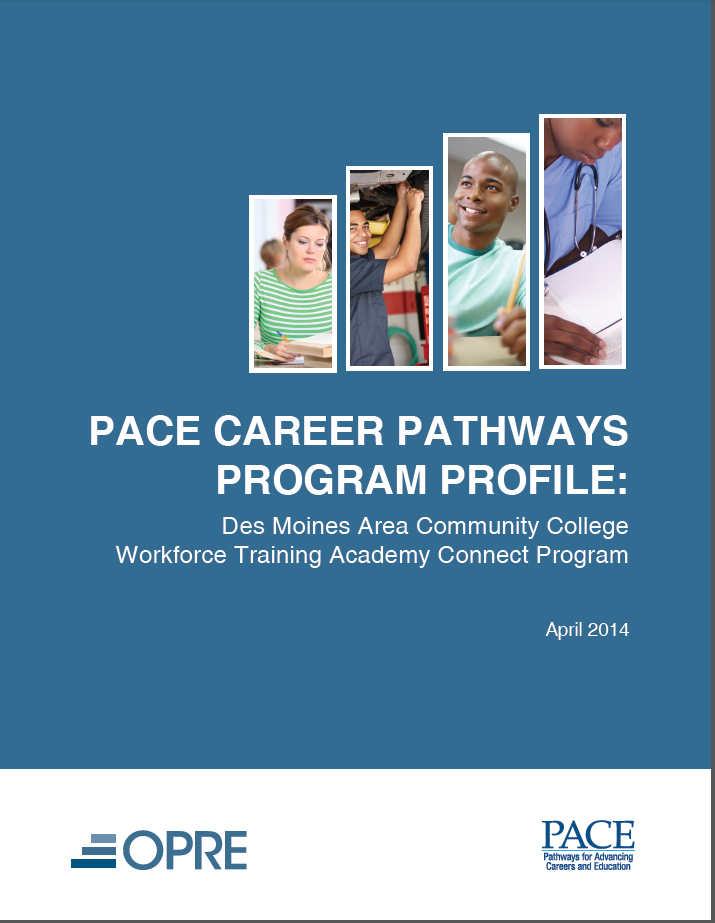 Career Pathways: Des Moines Area Community College Workforce Training Academy Connect Program (PDF) (16 pp, 5.6 MB) (April 2014)
Career Pathways: Des Moines Area Community College Workforce Training Academy Connect Program (PDF) (16 pp, 5.6 MB) (April 2014)
This profile is an overview of the Des Moines Area Community College (DMACC) Workforce Training Academy Connect (WTA Connect) program. Designed and operated by DMACC in Des Moines, Iowa, WTA Connect targets students who otherwise would not be eligible to enroll in vocational training certificate courses because of their low skill levels. The program intends to accelerate entry into vocational training by enabling students to pursue basic skills and occupational training simultaneously. Through support services and advising, WTA Connect aims to equip participants for success in their chosen course of study.
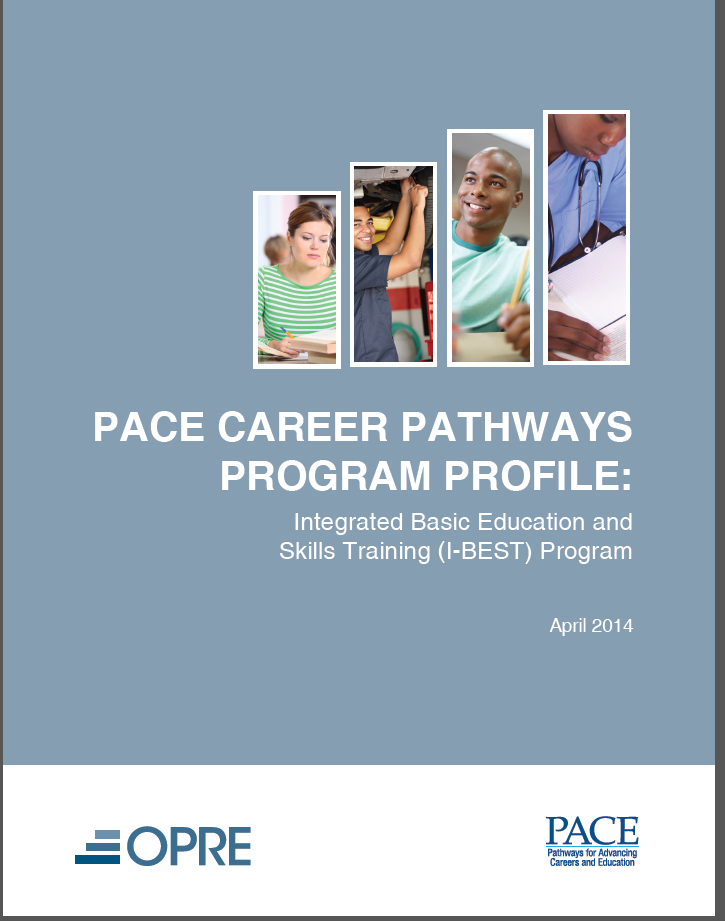 Career Pathways: Integrated Basic Education and Skills Training Program (PDF) (17 pp, 5.3 MB) (April 2014)
Career Pathways: Integrated Basic Education and Skills Training Program (PDF) (17 pp, 5.3 MB) (April 2014)
This profile is an overview of the Integrated Basic Education and Skills Training (I-BEST) program at three colleges in Washington State: Bellingham Technical College (BTC), Everett Community College (EvCC), and Whatcom Community College (WCC). I-BEST is a statewide, multioccupation career pathways program that targets individuals with low basic skills or limited English skills. By integrating basic skills instruction with occupational training and providing other support services, I-BEST aims to accelerate basic skills students’ transition into and through a college-level occupational field of study.
 PACE Evaluation Summary (PDF) (4 pp, 1.4 MB) (March 2014)
PACE Evaluation Summary (PDF) (4 pp, 1.4 MB) (March 2014)
PACE, formerly known as ISIS, is using an experimental design to assess the effectiveness of nine career pathways programs. The evaluation is supported by the Office of Planning, Research and Evaluation (OPRE) in the U.S. Department of Health and Human Services’ Administration for Children and Families (ACF). The evaluation is conducted by a team led by Abt Associates.
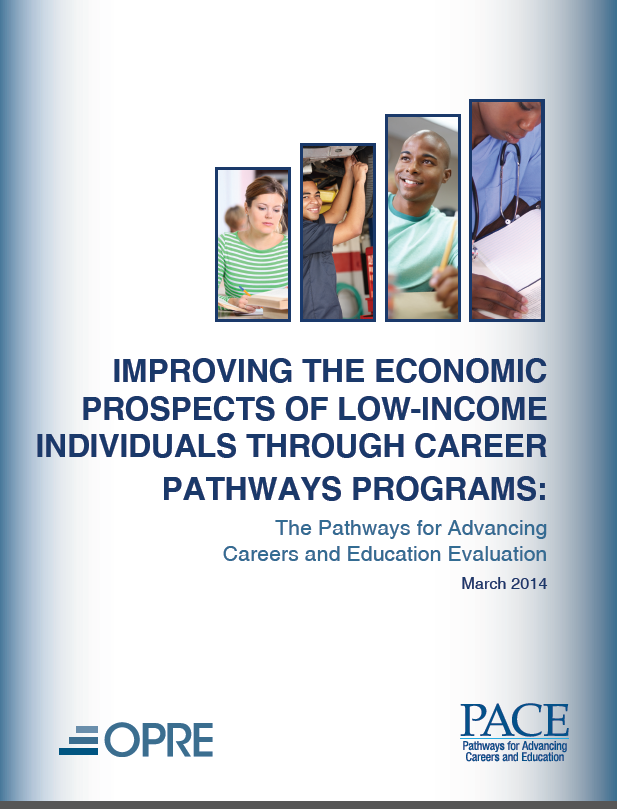 PACE Policy Brief (PDF) (18 pp, 1.5 MB) (March 2014)
PACE Policy Brief (PDF) (18 pp, 1.5 MB) (March 2014)
This brief focuses on PACE, formerly known as ISIS. It summarizes the framework used to describe the career pathways approach and the theory of change that guides the evaluation. It then describes the nine programs in the evaluation, and concludes with the study’s research questions and data sources. Later reports and briefs will present findings from the evaluation and will be posted on the project website
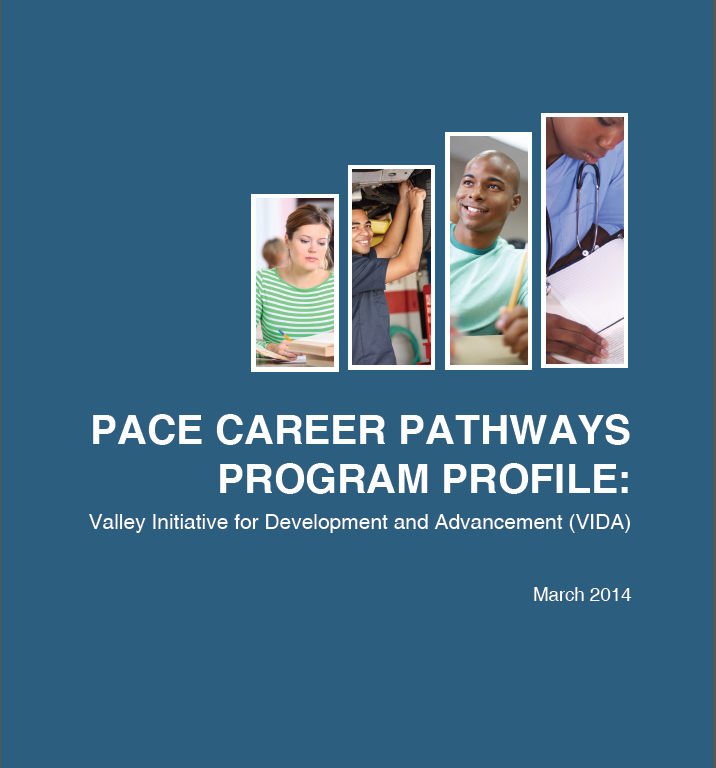 Career Pathways: Valley Initiative for Development and Advancement (VIDA) (PDF) (15 pp, 5.6 MB) (March 2014)
Career Pathways: Valley Initiative for Development and Advancement (VIDA) (PDF) (15 pp, 5.6 MB) (March 2014)
This profile is an overview of Valley Initiative for Development and Advancement (VIDA), based in the Lower Rio Grande Valley of Texas. A nonprofit, community-based organization that serves a four-county region, VIDA supports unemployed, underemployed, and low-income individuals, including those on public assistance, in their pursuit of certificate and degree programs in high-demand occupations. VIDA provides extensive wraparound support services and financial assistance to all participants so that they can attend college full time. VIDA also operates an intensive 16-week College Preparatory Academy that offers math and literacy remediation for individuals at the tenth- to twelfth grade levels so that they can pass the state college entrance exams and place directly into college credit courses.
Career Pathways: Workforce Development Council of Seattle-King County Health Careers for All Program (PDF) (15 pp, 5.7 MB) (March 2014)
This profile is an overview of Health Careers for All (HCA), designed and operated by the Workforce Development Council of Seattle-King County (WDC) in Seattle, Washington.2 HCA supports training for participants through two mechanisms: individual training accounts (ITA) to use at local training providers and the funding of classes specifically designed for HCA participants at local community colleges. Designated case managers (“navigators”) assist HCA participants in identifying and enrolling in appropriate training programs and provide assistance with support services, job search, and employment retention by helping participants navigate the education, workforce, and social service systems.
 Career Pathways: Instituto del Progreso Latino, Careras en la Salud Program (PDF) (15 pp, 5.6 MB) (March 2014)
Career Pathways: Instituto del Progreso Latino, Careras en la Salud Program (PDF) (15 pp, 5.6 MB) (March 2014)
This profile provides an overview of one career pathways program, Carreras en Salud (Carreras), designed and operated by Instituto del Progreso Latino (Instituto), a nonprofit organization located in Chicago, Illinois. Carreras was established to help low-skilled Latinos gain the necessary skills to move into Certified Nursing Assistant (CNA) and Licensed Practical Nursing (LPN) positions. Through a series of courses that include both basic skills instruction geared specifically for those interested in nursing occupations as well as health care training, Carreras is designed to provide participants with a clearly articulated pathway to progressively more skilled and higher paying jobs in the nursing field. The program also provides an array of services to support students while they attend classes.
Career Pathways: Pima Community College Pathways to Healthcare HPOG Program (PDF) (18 pp, 5.2 MB) (August 2013)
This profile is an overview of the Pathways to Healthcare Health Profession Opportunity Grant (HPOG) Program, designed and operated by Pima Community College in Tucson, Arizona.2 Pathways to Healthcare aims to assist low-income individuals attain high-paying healthcare jobs by providing articulated training in 16 targeted healthcare fields. The program offers a comprehensive service package that includes a contextualized basic skills course for individuals who need academic preparation prior to beginning occupational training, supports, counseling, and in-program and post-program connections to employment.
 Career Pathways: San Diego Workforce Partnership’s Bridge to Employment in the Healthcare Industry Program (PDF) (14 pp, 5.1 MB) (August 2013)
Career Pathways: San Diego Workforce Partnership’s Bridge to Employment in the Healthcare Industry Program (PDF) (14 pp, 5.1 MB) (August 2013)
This profile provides an overview of one career pathways program, Bridge to Employment in the Healthcare Industry (BTE), designed and operated by the San Diego Workforce Partnership (SDWP) in San Diego, California.2 BTE uses an individual training account (ITA) model to help participants pay for training programs in San Diego County, combined with extensive case management, supportive services, and employment services provided by community-based partners (navigator organizations) with whom SDWP has contracted for these services.
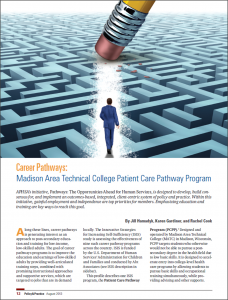
Career Pathways: Madison Area Technical College Patient Care Pathway Program (PDF) (3 pp, 1.08 MB) (August 2013)
This profile describes one PACE program, the Patient Care Pathway Program (PCPP) designed and operated by Madison Area Technical College (MATC) in Madison, Wisconsin. PCPP targets students who otherwise would not be able to pursue a post-secondary degree in the health field due to low basic skills.
PACE Career Pathways Program Profile: Madison Area Technical College Patient Care Pathways Program (PDF) (16pp,5.85 M) (May 2013)
This profile is an overview of the Madison Area Technical College (MATC) Patient Care Pathway Program (PCPP). Designed and operated by MATC in Madison, Wisconsin, PCPP targets students who otherwise would not be able to pursue a post-secondary degree in the health field because of their low skill levels. It is designed to accelerate entry into college-level healthcare programs by allowing students to pursue basic skills and occupational training simultaneously. The program also provides supports and advising
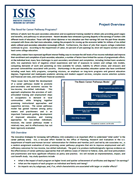 Pathways for Advancing Careers and Education (PACE) Project Overview (PDF) (2pp,465K) (February 2013)
Pathways for Advancing Careers and Education (PACE) Project Overview (PDF) (2pp,465K) (February 2013)
This two-page overview introduces the PACE study, formerly known as ISIS, a federally-sponsored project aimed at learning more about promising strategies for increasing employment and self-sufficiency among low-income families. Partner organizations will be part of a national evaluation of strategies to increase employment and promote self-sufficiency among low-income families and to promote the development of evidence-based policy and practice.
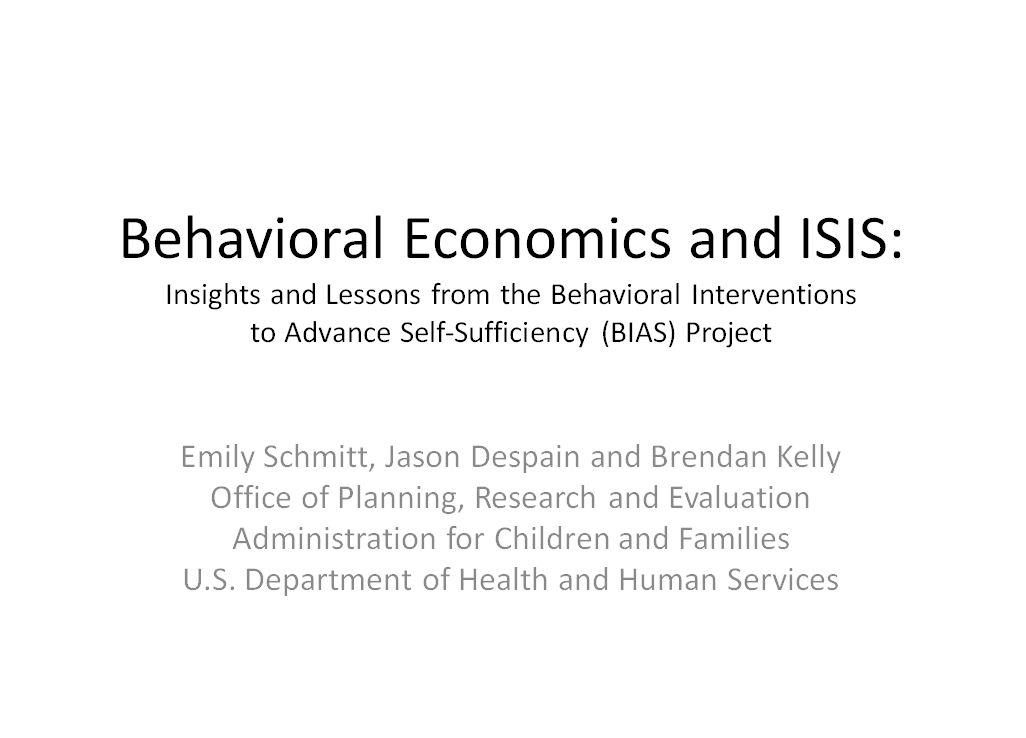
Webinar: Behavioral Economics and PACE – Insights and Lessons from the Behavioral Interventions to Advance Self-Sufficiency (BIAS) Project (PDF) (26pp, 1337K) (February 2013)
In this webinar, PACE Federal Project Officers Brendan Kelly and Emily Schmitt presented on behavioral economics and discussed how insights from ACF’s Behavioral Interventions to Advance Self-Sufficiency (BIAS) project may be helpful for the PACE Project and PACE partner sites. View the webinar.
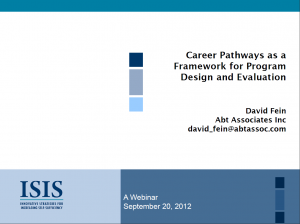 Webinar: Career Pathways as a Framework for Program Design and Evaluation (PDF) (24pp, 494K) (September 2012)
Webinar: Career Pathways as a Framework for Program Design and Evaluation (PDF) (24pp, 494K) (September 2012)
In this webinar, Dr. David Fein, Principal Associate at Abt Associates and PACE Co-Principal Investigator, introduced the career pathways framework as applied in PACE for evaluating programs for disadvantaged adults and disconnected youth, including highlighting examples from the collection of PACE partners. View the webinar.
 Career Pathways as a Framework for Program Design and Evaluation (PDF) (43pp, 790K) (May 2012)
Career Pathways as a Framework for Program Design and Evaluation (PDF) (43pp, 790K) (May 2012)
The career pathways model is emerging as a promising post-secondary education and training framework for low-income and low-skill adults. This paper provides an overview of the career pathways model, and discusses the principle intervention strategies included in the model, the theory of change for career pathways, and the considerations in designing random assignment evaluations of career pathway programs.
Joint Letter on Career Pathways (PDF) (5 pp, 602 KB) (April 2012)
This letter highlights the joint commitment of the U.S. Departments of Education, Health and Human Services, and Labor to promote the use of career pathways approaches as a promising strategy to help adults acquire marketable skills and industry-recognized credentials through better alignment of education, training and employment, and human and social services among public agencies and with employers.
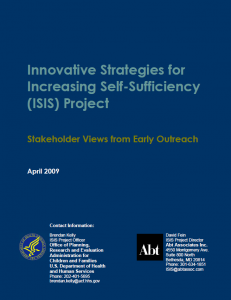 Stakeholders’ Views of Promising Next-Generation Employment and Self-Sufficiency Strategies for Low-Income Families (PDF) (12pp, 112K) (April 2009)
Stakeholders’ Views of Promising Next-Generation Employment and Self-Sufficiency Strategies for Low-Income Families (PDF) (12pp, 112K) (April 2009)
A key early step in identifying the type of interventions the PACE project would evaluate, this working paper summarizes results from discussions with over 250 individuals between May and September, 2008. Informants included a diverse selection of state executive office and agency staff, state legislators and staff, federal officials, researchers, advocates, and foundation representatives.
